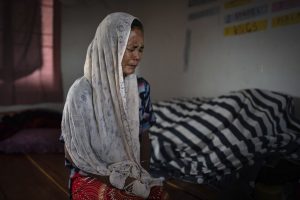The Indian border state of Manipur has been rocked by ethnic violence since May 3 this year. Mobs have burned down villages forcing over 60,000 people out of their homes. Over 130 people have lost their lives in the clashes between the majority Meiteis and the Kukis. A recent video of a mob sexually assaulting two women has brought the crisis in Manipur under the global spotlight.
Located in India’s Northeast, Manipur is home to several tribal groups including the Meitei, Nagas, and Chin-Kuki-Mizo tribes. Meiteis are mostly Hindus and live in the Imphal valley, while Nagas and Kukis, who are mainly Christian, mostly reside in the hills.
Manipur has a long history of ethnic conflict. The British colonial rulers’ policy of “divide and rule” sowed the seeds of strife among different communities. Administrative units were created to facilitate governance. This divided communities and altered the way they traditionally lived. Manipur was divided between the hills and the valleys. Post-independence, policies of successive governments in New Delhi continued to be clouded by ignorance and indifference to issues of the Northeast.
The immediate trigger to the recent violence in Manipur was a recommendation made by the Manipur High Court to the Bharatiya Janata Party (BJP) government in the state to include Meiteis in the Scheduled Tribe category. It sparked concerns among several communities, especially the Kukis, as they are apprehensive that if the High Court order is implemented, they will lose land and jobs due to potential competition from the Meitei community. They fear that the Meitei community will buy land in the hills, where the Kukis have had exclusive rights until now.
Adding to this was the Manipur government’s plan to identify and evict illegal migrants from the hills. There is also unease among the Kukis that the BJP government’s proposal for the introduction of the National Register of Citizens (NRC) and Chief Minister Biren Singh’s plans to oust illegal migrants from the hills will have an unsettling impact on the tribal populations here.
Although Meiteis comprise 51 percent of Manipur’s population, they hold only 10 percent of the land in the state. On the other hand, Kukis and Nagas, who comprise 40 percent of the population, occupy 90 percent of the land. Due to their larger numbers, Meiteis have a larger share of representation in the legislative assembly, encouraging Meitei majoritarianism. Since the late 1990s, Manipur has seen only Meitei chief ministers. It has led to growing resentment among the Kukis, who feel marginalized and underrepresented in the political arena. Manipur’s minorities also point out that the bulk of the state’s budget and development work is focused on the Meitei-dominated Imphal valley.
Allegations of illegal migration and demographic changes have also contributed to tensions between the Meiteis and the Kukis. The higher decadal growth rate of the population in the hills compared to the valley in the 2011 Census has raised suspicions that people are illegally migrating from neighboring countries like Myanmar, Nepal, and Bangladesh. The perceived demographic shift and an increase in the population of non-indigenous communities have led to concerns about Meitei marginalization in Manipur.
Manipur shares a border with conflict-ridden Myanmar, which is infamous for poppy cultivation and drug trafficking. Poppy grown in Manipur’s hill areas feeds the drug trade and is an important source of livelihood for tribal groups living there. The state government’s war on drugs has evoked resentment among the Kukis, who see it as a ploy to deprive them of their livelihood.
The ethnic conflict in Manipur is a complex one that has deep-rooted historical and social dimensions. The recent violence has added to its complexity and will make it harder to resolve.
It is therefore concerning that instead of taking steps to halt the violence immediately, BJP governments in New Delhi and Imphal failed to respond swiftly. Although a complaint regarding the gang rape of two Kuki women by a Meitei mob in early May was filed immediately, it took police 78 days to detain the accused. Chief Minister Singh has shown extreme reluctance to act against the mobs.
As shocking has been the response or rather the lack of it by the central government. Prime Minister Narendra Modi was silent on the Manipur crisis for months. It was only after the Chief Justice of India D.Y. Chandrachud urged the government to act that Modi issued a rather bland statement just ahead of parliament’s monsoon session.
The violence has concretized the Kuki-Meitei divide, which will take a long time to heal. So deep is the mistrust between communities that there are allegations that the security forces and law enforcement agencies are divided along ethnic lines. If there is any truth to these allegations, then it will be even more difficult to deal with the volatile situation in Manipur.
Addressing the Kuki-Meitei conflict requires a multifaceted approach and the collective efforts of all stakeholders involved. Retrieval of weapons that mobs looted from police armories must be prioritized. Efforts should be made to involve civil society organizations in promoting dialogue, peacebuilding, and reconciliation between the communities. Political leaders from different communities should sit down for dialogue and find ways to reduce tensions. Forming a committee to look into the genuine development issues raised by different communities could be a positive step toward addressing the grievances and concerns of the affected communities.

































